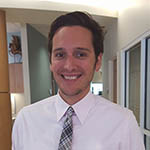 My wife and I were having lunch at a nice burger place in Disney Springs not too long ago. The restaurant was packed and there was nowhere to sit. So, we ended up sharing a table with a few other folks. After exchanging pleasantries, we found out that everyone at our table was either active duty or retired military. What are the chances? I told them I like to hire vets – they seemed interested – so I told them the following story.
My wife and I were having lunch at a nice burger place in Disney Springs not too long ago. The restaurant was packed and there was nowhere to sit. So, we ended up sharing a table with a few other folks. After exchanging pleasantries, we found out that everyone at our table was either active duty or retired military. What are the chances? I told them I like to hire vets – they seemed interested – so I told them the following story.
I explained to them that I used to make a lot of mistakes hiring. I had a very narrow view of who would be a good candidate. My philosophy was something I was falsely proud of at the time. My approach? I used to look for people who were just like me – literally. Similar education. Similar background. Similar career trajectory.
I figured that if I could find someone just like me, then I would find a great candidate. Right? The problem with that approach is that we tend to evaluate ourselves in an ideal light with no flaws, no shortcomings, no weaknesses. In essence, it turns into a search for perfection which does not exist. So, after many years of suffering through this type of hiring, I stopped. It wasn’t working. I couldn’t fill positions. I felt like I was always settling for second best. I decided to flip the whole thing around and try to hire on soft skills – you know, the kind of skills you can’t learn in school, skills such as empathy, caring, listening, hunger, passion, reasoning, patience.
Their faces lit up across the table. I could see I was striking a nerve. I went on to tell them that this shift to soft skills led me to start hiring veterans. They did not necessarily fit into my particular creative field. There was literally no previous work experience relevant for my openings. And, on paper, their resumes did not fit the job description. But life is not lived on paper, so I took a chance, and something started to click.
What I found was an inherent discipline in U.S. military vets that allows them to achieve extraordinary accomplishments in the creative field. It was absolutely a light-bulb moment. It is this discipline coupled with soft skills that made any objective possible, almost like completing a mission, and so much so that I am certain it will work in any field, not just creative fields like mine.
The unemployment rate for vets stands at 4.0% based on the latest data from the Department of Labor released on Dec. 7. And, in my opinion, that is 4.0% too high. Because not only have vets and their families given the highest sacrifice for our country, they are infinitely employable in the private sector – a hidden asset, an untapped resource. Even if a candidate is not perfect on paper, I will often scan down to see if there is any military service record. And if there is, there is at least an initial conversation. Many conversations have led to interviews. Many interviews have led to hires.
I thanked the nice couple at my table for listening to my long and boring story. As we were gathering our things to leave, one of the Marines stopped us. She shared a story about how hard it was for her friends who just got out of the service to find gainful employment. And what she said next completely caught me by surprise – she thanked me. I told her that I was undeserving of the praise because I felt like I haven’t done much compared to what she and her family have done. But she then told me something important – something that stuck with me – something simple yet profound: She said that every little bit helps. I have been thinking about it for weeks now. And it’s still profound in its universality.


